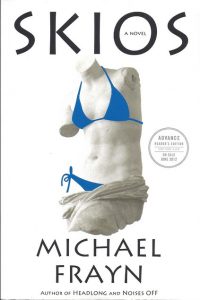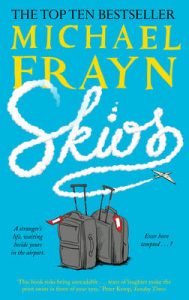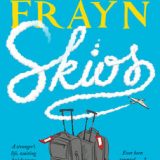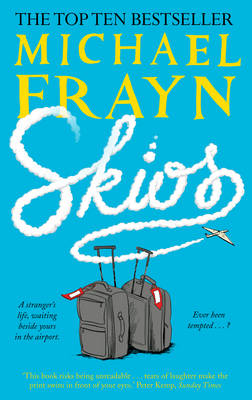Skios – Michael Frayn – 2012
Posted by Lale on 21/4/2013, 10:43:17 
I am half-way through Skios and it is fun. It would make a fun movie, of course. And similar ones have been made already, it is not an entirely new idea.
It reminds me Jerzy Kosinski’s “Being There” (the only book of that author that I like, all his other books I read were awful in my opinion and I think the author was a bit sicko, he was saved from the Charles Manson attack by a lucky mishap with his flight, I believe he killed himself at the end.)
What I like in this book is the comments on conferences and speakers. I am involved, in one way or another, with conferences/presentations/seminars/etc, maybe 20 times per year. I found the descriptions of such events very accurate (once you strip away the caricatures).
In my experience, you can never control what will come out of the mouth of your speaker. You can choose the most recommended speaker with pages-long credentials and an impressive resume. Then he/she can come and say stupid things or outrage the audience. I often feel like Nikki, praying for the speech to turn out well.
Lale
~
Posted by guillermo maynezUser on 9/4/2013, 14:18:39
Before I forget, I will post some comments on “Skios”. Steven said there would probably be not much to discuss about it, and he may be right. But there are a few points worth making about it: as farce, it works well; it is funny, the characters and situations are outrageous, and it all goes out of control, except from the writer’s hands. Frayn manages to keep a lot of balls flying without falling down… except at the ending. Frankly, the final shooting which resolves everything leaves many reckonings and showdowns missing. Farce could have been intensified to a satisfactory ending by forcing the characters to face the consequences of their decisions, especially Oliver Fox, an impostor whose only virtue as such is his total lack of shame and prudence (which, of course, is the indispensable virtue to be a good trickster). I don’t know, I expected something even more farcical and crazy as an ending.
That said, I enjoyed it as a piece of funny, imaginative fiction. The satire on Foundations, Institutes, etc. is great, and reminded me a LOT about many meetings I’ve attended. Many such organizations, people, and events deserve to be this harshly made fun of. Hypocrites.
A good entertainment.
~
Posted by Sterling on 9/4/2013, 21:50:24, in reply to “Skios (spoilers)”
I agree with almost everything you said, Guillermo. Frayn is the author of “Noises Off,” the finest farce I’ve ever seen. (I caught two different productions on Broadway. I believe it’s the only play I’ve seen twice. On Broadway, at least.) He has proven himself a master farceur. What tickled me about the ending of Skios was the total unexpectedness. He actually dismisses in a paragraph the conventional farcical denouement. He then veers off from bedroom farce (leavened with satire) into something much darker and grimmer. It’s a stunning risk. Does it actually work? Well, I think that’s a matter of opinion. I was delighted by it, but I gather that you, Guillermo, were disappointed. Oh, well. It has been claimed that Edmund Kean’s last words were: “Dying is easy. Comedy is hard.”

Posted by Steven on 10/4/2013, 8:45:19, in reply to “Re: Skios (spoilers)”
I liked the ending as well for its complete unpredictability–and coming at a lecture supposedly about the idea of predicting the most valuable lines of scientific research. Of course the whole story is full of improbable coincidences, such as Nikki, Georgie and Georgie’s boyfriend all showing up on the same island at the same time, so the “fire” ending is actually one of the least improbable things that happens in the novel.
~
Posted by Sterling on 13/4/2013, 18:34:17, in reply to “Re: Skios (spoilers)”
Boy, I really guess we don’t have a lot to talk about with this one! :^)
Just a passing comment. Guillermo, you and I are certainly forming different opinions of leading characters this year! Your initial take on Razumov in Under Western Eyes was to feel sorry for his plight. I intensely disliked him.
Similarly, you expressed the wish that Oliver Fox (Phoksoliva! LOL) be forced to endure the consequences of his behavior. But as far as I can see, Oliver is not an evil man, just a playful and irresponsible one. He doesn’t really do anything bad to anybody. He doesn’t intend to impersonate Dr Wilfred — he just falls into it. He doesn’t intend to steal Dr. Wilfred’s suitcase. Dr Wilfred might have avoided the suitcase switch if he had been paying attention and not been so busy sending a withering putdown (by text!) to some nobody in an obscure journal (in Manitoba!) who has wounded his professional pride.
Oliver’s not a trickster figure, in my opinion, because he never plans anything not does he intend evil or even mischief. He’s a bit of a bounder with girls, but, let’s face it, Georgie is the kind of girl who will cheat on her boyfriend with someone she has talked to in a bar for five minutes, and Nikki is ready to jump into bed with the guest speaker whom she has hardly met. I rather liked both girls and did not wish them ill, but they are scarcely paragons of feminine virtue. And one of the prime satirical points of the novel is that everyone assumes Oliver’s inane utterances are profound simply because they believe him to be Dr. Norman Wilfred.
~
Posted by Steven on 14/4/2013, 9:36:48, in reply to “Re: Skios (spoilers)”
I didn’t strongly like or dislike any of the characters in the book, although I don’t care in real life for people like Oliver who are totally irresponsible yet consistently popular because of good looks and a glib tongue–jealous, I suppose. Of course how could any male reader not enjoy Georgie, as she is naked most of the time. But that’s a good point about both Nikki and Georgie being willing to jump into bed with a man on the basis of a few minutes’ acquaintance. Though that accords with the way people so easily fall for Oliver’s bluffing his way through as a great scientist. We are all too eager to see in others the affirmation of our expectations and not to think critically, whether it’s based on professional reputation or our romantic fantasies.
~
Posted by Guillermo MaynezEmail User on 14/4/2013, 11:49:12, in reply to “Re: Skios (spoilers)”
I guess what’s happened is that I’m a bit of a lousy conveyor of my own thoughts. I liked Phoksoliva a lot, and I am very glad he tricked them all. I have to stand so many Sacred Cows, and see how people drool over their every utterance, that it is very nice to see a portrait of the artist as a stand-in for some big shot. The final reckoning I was expecting (and which wasn’t a turn-off from the book, just a minor disappointment) wasn’t based on my wish to see Oliver Fox brought to justice, but to see, maybe, how he easily fooled them once again. It would have been nice to see him get away with it all just nicely.
I felt for the real Dr. Wilfred (Nikki seemed a ready boccato di cardenale), and was also sorry that everybody missed the chance of doing something with the happily naked Georgie (let’s hope some unscrupulous Hollywood tycoon is already making the movie).
Greece, oh Greece! What a great place to play the fool!
Posted by Lale on 26/4/2013, 18:28:04, in reply to “Re: Skios (spoilers)”
~~
Dear Friends,
I finished the book, I enjoyed it tremendously until the finale which to me seemed a little like the author was tired of juggling the balls and just wanted a short-cut. I agree with Guillermo that farce could have been intensified at the end. This ending will not be as brilliant in film as, say, the ending of Blues Brothers.
I was happy that Oliver was tricking all those hypocrites.
I too have been in many conferences where, maybe not all, but at least some of the speakers sounded like Oliver Fox explaining his theory with the coffee cups. Somtimes i sit there listening to really really stupid things when other epople are genuinely applauding them.
I did not get why the lady (Mrs Sparskova or something) who does not speak a word of English, all of a sudden became interested and amused (it happened at the moment Oliver Fox said his name). I only figured it out when they were in the taxi and Oliver said phoksoliva, and she said no, no, no phoks.
Written in the form of a Greek play, everything happening within 24 hours.
I don’t think Dr. Wilfred will be giving any more speeches. He was already questioning them on the plane when he was arriving at Skios.
Lale
~
Posted by Sterling on 2/5/2013, 22:06:37, in reply to “Re: Skios (spoilers)”
It’s debatable whether he pulled it off, but Frayn was after bigger game here than standard farce. Thirty years ago, he wrote a near-perfect bedroom farce, “Donkeys’ Years,” and then topped it with “Noises Off,” which parodies and deconstructs bedroom farce using the play-within-the-play, “Nothing On.” (Are you still with me?) In Chapter 48, he describes a typical farcical conclusion before dismissing it. This is, after all, also the author of “Copenhagen,” a play about quantum mechanics in which the leading characters are the physicists, Niels Bohr and Werner Heisenberg. It dramatizes both principles of quantum physics and an actual meeting between the two physicists in 1941.
In Skios, the sly old dog (he’s 79) utilizes the form of farce to illustrate principles of causality. There is a definite philosophical intent to this farce. The tiniest gestures precipitate huge consequences. This is actually illustrated throughout the novel, but Frayn realizes that we may become too caught up in the humor to recognize it. Therefore, at the ending he feints toward traditional farce and then shows how the smallest variation of circumstance can derail the story into another path entirely. Given his interest in rarefied theoretical physics, I am inclined to think that Frayn was engaging the concept of the multiverse.
I think Skios has more in common with farce than Greek drama, although he does indeed maintain the Aristotelian unity of time. Arguably, since it all takes place on Skios, he also maintains unity of place, although the feel of the novel is of two very different locales, the Foundation and the villa. He does not maintain unity of action. His plethora of subplots is much more classic bedroom farce than Greek comedy. However, the satire is reminiscent of Aristophanes’ Old Comedy and the bedroom antics suggest New Comedy and Roman comedy. (Think “The Comedy of Errors, which is a direct borrowing from Plautus.)
It helps to be familiar with Frayn’s other work. In addition to those mentioned, he wrote Headlong, a comic novel involving a long-lost painting by Bruegel the Elder, with much discussion of art, art history and the meaning of images. It was short-listed for the Booker. He has translated all the major Chekhov plays into English. His play, Democracy, is another fact-based play, this time based on Willy Brandt in 1960s West Germany. Most of his work is comic, but a great deal of the comedy is used to illustrate much deeper waters.
~
Posted by guillermo maynez on 3/5/2013, 11:26:15, in reply to “Re: Skios (spoilers)”
Let’s say again that the great value of this group, small but select as it is (ha)lays in the contributions we make to enhance the others’ reading experience. “Skios” could be read simply as a farce but it clearly has something else. Comments like Sterling’s help illuminate what that something is. Good-to-great authors don’t have “books” they have an “oeuvre” or body of work which constitutes a unity. From what Sterling says, this seems to be the case with Frayn, and so we (at least I) should read some of his other works in order to appreciate his whole universe. I’ll do that. Just as an example, one can not get an idea of Balzac by reading one or two of his novels, and although it’s virtually impossible to read all his novels, there is a substantial body of work there from which one should read several of the books in order to have an idea of what Balzac is about. There.

Posted by Steven on 4/5/2013, 8:43:07, in reply to “Re: Skios (spoilers)”
I think from an aesthetic standpoint any work of art should strive to stand on its own such that, if it’s dug out of the the ground 10,000 years from now and no one knows who created it, when or why, it would still be judged to have merit. But art, and literature especially, does inevitably reflect its times and its creator, and the more you know about them, the more you are likely to appreciate it.
I usually try to read an author’s works–at least the major ones–in chronological order. As soon as we finalized our reading list for 2013 I laid out a schedule that included reading one book per month each by Frayn and Ondaatje–two authors I had never read before–leading up to our May selections. Unfortunately other priorities got in the way and, while I did read three books by Ondaatje, I didn’t get to any of Frayn’s. But obviously I do agree with what you say about the value of approaching an author’s work as a whole.
(Incidentally, since you mention Balzac, one of the other priorities that got in the way of reading Frayn was that I read three novels by Balzac. I’ve also read five novels by Émile Zola in the last six months.)
~
Posted by Lale on 4/5/2013, 9:44:19, in reply to “Re: Skios (spoilers)”
I am intrigued about Frayn’s previous work, they have really interesting titles. Maybe he will be my next Muriel Spark. I was actually reminded of her books while reading Skios.
Lale
~
Posted by Guillermo Maynez on 4/5/2013, 9:55:46, in reply to “Re: Skios (spoilers)”
Steven: it would be nice if you shared the titles of the books by Balzac and Zola you just read, and also a brief comment on how you liked them. It’s always interesting to know what other books people here are reading. It may lead to good recommendations.
~
Posted by Sterling on 4/5/2013, 14:44:17, in reply to “Re: Skios (spoilers)”
Just some thoughts. I agree that a work of art should be able to stand on its own, unless it is clearly defined as part of a larger whole. No reasonable person expects The Two Towers to be a satisfying read apart from The Lord of the Rings. Or, to keep it more literary, The Guermantes Way apart from In Search of Lost Time.
One step away is John Updike with his Rabbit novels. They’re all good novels in their own right and can certainly be read as stand-alones, but they gain immeasurably by being read in order and context. One then comes across works like those of Balzac and Zola, in which most of the novels can be read as stand-alones, and that few readers attempt in order. However, they are interconnected, and the novels benefit from being read in the context of the other novels in the cycle. Faulkner’s Yoknapatawpha novels fall into this group, I think.
Finally, you have those authors like Frayn, whose works bear no specific connections to one another. In the case of Frayn, I think it helps to interpret a frothy, if slightly puzzling, novel like Skios in light of some of his other work. This is certainly true of many authors — Conrad, Nabokov, Tolstoy, Camus, etc. With other authors, however, I don’t know if a larger reading of their work provides much enhancement for the enjoyment of a specific novel. Almost anyone can identify Hemingway’s or Dickens’ preoccupations and themes, I should think. I don’t know though how much familiarity with other works of the author can enhance one’s appreciation of The Sun Also Rises or Bleak House.
- Related:
- Book Reviews















